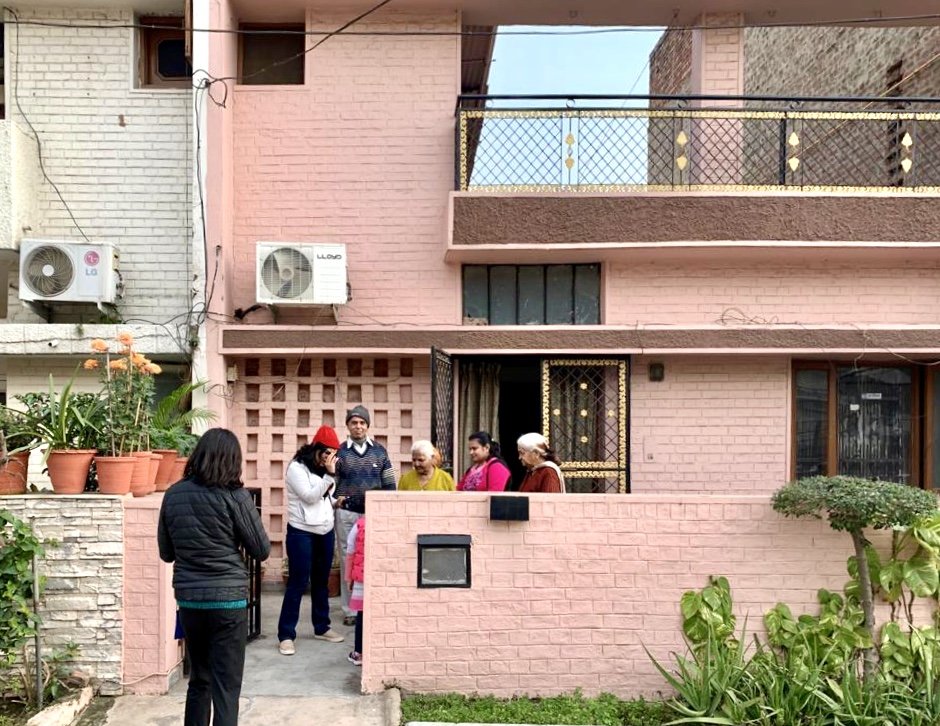The people of Rubáiyát
Anjali (owner)
(Awkwardly) upwardly mobile
Decidedly middle-class
Anjali grew up in shared spaces with her extended family or in public housing quarters in Chandigarh, northern India. Like many middle-class kids of her generation, Anjali leveraged the opportunities presented by India’s economic liberalization and state-sponsored university education in both India and the US to build a successful career in the private sector in science.
Anjali (red cap) chats with her uncle and family in front of her grandmother’s home in Chandigarh.
No one told you the race may be over
Much of Anjali’s adult life has focused on ensuring that the strides she has made professionally and in her impeccably planned personal life are not reversed. Aside from her love of traveling, her indulgences are few and far between. “The middle class never quite leaves you.”
Anjali looks on as her younger daughter cartwheels in Taipei.
Super busy in the super city
Anjali is settled in the southern Indian city of Bengaluru. Here she runs her business and raises her two school going children.
Anjali (lying down) catches up on messages, while her older daughter rests in the arms of her grand-mother after a hectic day spent at school and sitting through Bengaluru’s notorious traffic.
Bursting at the seams
Like many of India’s supercities, Bengaluru is crumbling under the weight of an estimated 15 million people. It is rapidly running out of open spaces and groundwater. Yet new entrants across the income spectrum continue to arrive in the city every day, chasing economic opportunities.
Post rush-hour traffic in front of Anjali’s apartment complex in Bengaluru
Late-stage learning
Although Anjali owns her apartment in Bengaluru, she had no prior experience designing and managing a construction project. After many years specializing in pharmaceutical sciences, including earning her Ph.D., Rubaiyat presented an opportunity to learn something completely new. However, the process has not always been smooth.
Anjali surveys the upper-level slab concrete as the civil contractors look on.
Rediscovering local
One of the most rewarding aspects of the project for Anjali was gaining an understanding of the history of local construction materials. Over 80% of the materials (by weight) were sourced from within a 300-kilometer radius of the project site. The terracotta roof and ceiling tiles used on the project were made in Kozhikode, just 100 Kilometers away.
Anjali amongst mid-18th century equipment at the Commonwealth Trust Terracotta factory in Kozhikode
Around the world and back again
The terracotta factory exemplifies the rich layers of history in the Malabar region of Kerala. Established by the German Basel Mission in the mid-1800s, the Commonwealth Trust aimed to provide employment for new Christians. Following Germany's defeat in World War I and the signing of the Treaty of Versailles, the factory was taken over by the British as reparations. After India’s independence, it was transferred to an employee-owned trust, which currently operates the factory. The production lines and equipment remain largely unchanged from their original German.
Terracotta tiles being air-dried after baking at the Commonwealth Trust factory in Kozhikode
Locally Sustainable
The teak wood used for the doors, steps, and benches comes from forests in Wayanad and neighboring districts. It is processed in mills along the Chaliyar River, where the water is used to prime and transport the wood. The lumber is planted, tagged, grown, cut, and auctioned by the individual state forest departments in controlled quantities.
The lumber mill along the Chaliyar river where the wood used on the project were processed
Open spaces and unanswered questions
A bigger challenge has been learning about her new asset—about 7 acres of agricultural land primarily anchored by coffee but featuring a mix of other crops. The financial viability of the estate remains uncertain, and Anjali often second-guesses her decision to take on this project at this stage of her life. However, she enjoys interacting with the farm workers, appreciating the clean air and wide-open spaces. It also provides her with an opportunity to enhance her Malayalam, which she has been learning for over 20 years.
Anjali with her daughter scoping out the area where the Miyawaki forest now stands.










